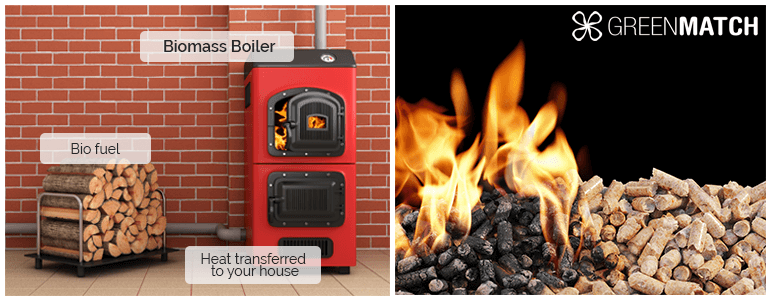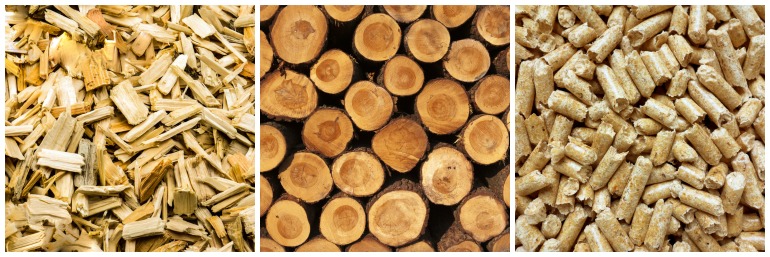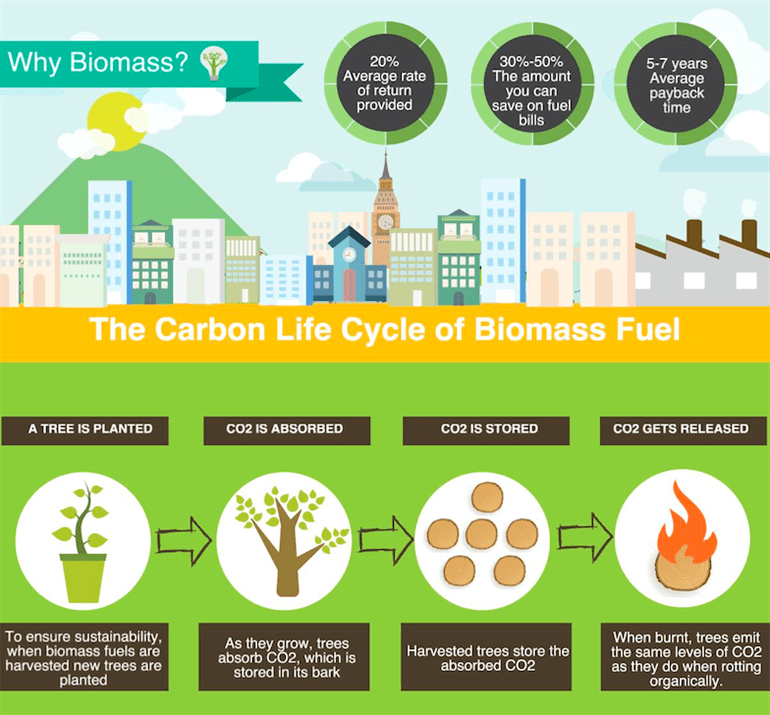Answer these simple questions and we will find you the BEST prices
Which type of solar quotes do you need?
It only takes 30 seconds
100% free with no obligation

Get up to 3 quotes by filling in only 1 quick form

Slash your energy bills by installing an energy efficient boiler

We’ve helped over 500,000 homeowners reduce their carbon footprint
- GreenMatch
- Boilers
- Biomass Boilers
Biomass Boilers: Everything You Need to Know

Wood and its derivatives are not new types of fuel. Actually, its use for domestic heating purposes is centuries old. However, modern technology has improved them considerably to the extent that they can be used directly with highly efficient boilers.
As a biological material, wood and wood derivatives fall under the category of biomass fuels. These include woody fuels and animal wastes. Nevertheless, boilers running on biomass fuels –hereafter referred to as biomass boilers– mainly use logs, wood pellets or wood chips.
In this article, we’ve comprehensively covered biomass boilers. From how they work to how expensive they are to run, you will learn everything you need to know in the sections below.
Interested in a biomass boiler? GreenMatch can help you find the one that best meets your needs. We will save you hours of research time thanks to our team of heating experts and our nationwide network of partner installers. Ask for quotes now, and we’ll send you up to 3 tailor-made quotes for free. You are not obliged to accept any of the quotes you receive.
- Quotes from local engineers
- Payment by finance available
- Save up to £975
It only takes 30 seconds




What Are Biomass Boilers?
As we just mentioned, biomass boilers are boilers that run on biomass fuels. They are a sustainable alternative to fossil-fuels-burning boilers, as the woody fuel they use is a carbon-neutral, renewable energy source.
Other than that, biomass boilers do the very same job as gas and oil boilers. They burn a certain fuel to provide central heating and domestic hot water to your home.
Biomass heating may involve the use of a wide range of organic materials from plant-based organisms. Domestic biomass boilers, however, are designed to work mainly with 3 types of fuels:
How Does a Biomass Boiler Work?
When you turn on your biomass boiler, an electric probe ignites the wood fuel. The heat it produces is then controlled by thermostats that adjust both fuel supply and fan speed.
The hot gases produced during the burning process flow to the heat exchanger, where the heat is passed into the water used for the biomass heating system. Then, the water circulates through your home’s pipes to the radiators heating the property or your taps, providing you with hot water.
What fuel does a biomass boiler need?
As we already mentioned, the most common energy source for domestic biomass heating systems is wood in the form of logs, pellets or wood chips.
Whilst they have many environmental and cost-wise benefits compared to fossil fuels, they also need more storage space. Wood chips and pellets are commonly used in automated systems. Logs, on the other hand, must be manually fed into the boiler.
Wood pellets consist of compressed sawdust and wood shavings. They are 100% natural, renewable and easy to use. Their energy content is higher than logs or wood chips, so they do not require as much storage space as you would need for chips or logs. In other words, wood pellet boilers are small and require minimal input from the user.
Wood chips are made by cutting larger pieces of wood. They require less energy for manufacturing, processing and transportation than other wood fuels. Thus, their cost is lower. When produced through sustainable forestry practices, wood chips are a renewable energy source. Nevertheless, their efficiency cannot match that of pellets.
In any case, you would need to pay attention to the fuel's moisture level. If the moisture level is not adequate (around 8% for pellets and 25% for chips and logs), the burning process may also produce too much smoke and tar.

Are Biomass Boilers Environmentally Friendly?
Unlike fossil fuels, which can take millions of years to form, biomass is relatively sustainable and environmentally friendly. It is possible to replenish stocks by growing new plants or trees.
Vegetal-origin biomass is also a carbon-neutral source of energy because all the carbon dioxide it releases when burning is the same amount the plant absorbed from the air while growing. It is worth noting that if it wasn't burnt for fuel, the plant would release this carbon into the atmosphere at the end of its life anyway.
In this regard, biomass boilers in the UK can help lower carbon emissions, which is essential if we’re to achieve net-zero carbon emissions by 2050.
However, there is also a potential environmental downside. In order to get fuel for domestic biomass boilers, trees must be cut down. So for a biomass heating system to be carbon neutral, new trees will need to be planted to replace those cut down for fuel. The problem is that trees take many years to grow.
Thus, growing demand for this fuel could lead to an increase in deforestation.
Are Biomass Boilers Cheaper to Run?
Domestic biomass boilers can be 30-50% cheaper to run than their fossil fuel counterparts and more than 4 times cheaper than electric boilers.
You should also consider the delivery costs of the fuel. To minimise it, you can order a year’s energy supply, though you will need the space to store it. If you don’t have a large storage space, wood pellets are the most space-saving option. They can be delivered on pallets of 10 kg bags.
If you have access to a wooded area, wood logs are also a good option to keep running costs low. You could potentially gather them for free; you just need to know where to look.
Below are the estimated prices per tonne and per kWh for each biomass fuel. Keep in mind that prices may vary depending on your region and supplier.
| Biomass fuel prices | ||
|---|---|---|
Biomass fuel | Price per tonne | Pence per kWh |
Logs | £150 (potentially free) | 4.2p (potentially free) |
Wood pellets | £250 | 5.2p |
Wood chips | £100 | 2.9p |
Another way to save money on your new biomass boiler's total cost is to compare quotes from multiple installers. As heating engineers’ rates vary considerably from company to company, you could save more than £200 by choosing the best deal out there. Yes, that’s approximately the price you would pay for 1-2 tonnes of biomass fuel for your boiler.
Click on the button below, and we will send you up to 3 non-binding quotes from heating engineers in your area. Don’t miss the chance! You could save enough money for your first fuel supply. Our service is free of charge.
- Quotes from local engineers
- Payment by finance available
- Save up to £975
It only takes 30 seconds



Biomass Boiler Efficiency
Biomass boilers can deliver efficiencies of over 90%. In this regard, they have a performance similar to that of modern gas and oil condensing boilers.
The efficiency of a boiler relates to how much of the fuel is converted into usable energy. To put the figure above into context, it means that per every £1 spent on biomass fuel, only 10p will be lost. The higher your biomass boiler efficiency, the less energy you will waste.
Where Do You Place a Biomass Boiler?
Just the biomass boiler unit itself won’t take up much space. You can place it in a standard utility room as they are about the size of a four-drawer filing cabinet. Depending on the dimensions, a garage may be a more suitable option.
Log boilers, however, generally need more space, as they are fairly bigger. It is better if you fit them in dedicated plant rooms instead.
In all cases, the real issue is not the biomass boiler but the space you need to store the fuel.
Besides the main unit and the fuel storage, your biomass heating system also needs:
Should I Invest in a Domestic Biomass Boiler?
First, getting a new biomass boiler for your home will help reduce carbon emissions, which is a solid reason to invest in it.
However, you must be aware that, at £5,000 to £15,000, the initial cost of a biomass boiler is much higher than gas, LPG, oil, and electric boilers. Nevertheless, you might consider a biomass boiler a long-term investment as its low running costs will make it pay for itself over time.
On top of that, if you install a biomass boiler (or another low carbon heating system), you can benefit from government grants such as the Boiler Upgrade Scheme.
With this scheme, you can get £5,000 off the upfront cost of a biomass boiler and its installation. However, biomass boilers are only eligible if installed in rural locations and in properties disconnected from the gas grid.

Are you considering installing a biomass boiler? Then you think as environment-conscious homeowners in the UK do. The future of domestic heating points towards low-carbon heating systems. This is particularly relevant and game-changing for the UK, where the majority of households rely on fossil fuel-burning appliances to heat their homes.
At GreenMatch, we can provide you with up to 3 tailor-made free offers for biomass boilers from suppliers near you. Get started by clicking the button below.
- Quotes from local engineers
- Payment by finance available
- Save up to £975
It only takes 30 seconds



FAQ
A biomass boiler is a boiler that runs on biomass fuel (wood logs, chips or pellets). They are a sustainable heating system, as the woody fuel they use is a carbon-neutral, renewable energy source.
Biomass boilers are as efficient as gas or oil boilers, but their environmental impact is far from being as harmful as that of their fossil-fuel-burning counterparts. A new biomass boiler for your home will help reduce carbon emissions, and that is a solid reason to invest in it. Additionally, their low running costs will compensate for their high initial costs.
The biomass unit itself won’t take much space. Depending on its dimensions, you can place a biomass boiler in a standard utility room or maybe a garage if it is too big. Log boilers, however, are generally the biggest ones, so it may be better if you fit them in dedicated plant rooms.
Biomass boilers can last around 20 years if properly maintained. They have an average payback time of 5-7 years after installation.
Unlike fossil fuels, using biomass for domestic heating is relatively sustainable and environmentally friendly. It is possible to replenish wood stocks by growing new plants or trees. Furthermore, wood is considered a carbon-neutral source of energy.
However, there is also a potential environmental downside. In order to get fuel for domestic biomass boilers, trees must be cut down. Thus, a growing demand for wood could lead to an increase in deforestation.

Luis Antonio is a seasoned Content Writer with international journalism experience. His writing style, enriched by a Master’s in Journalism, contributes informative content to GreenMatch on topics including low-carbon heating systems.
We strive to connect our customers with the right product and supplier. Would you like to be part of GreenMatch?





